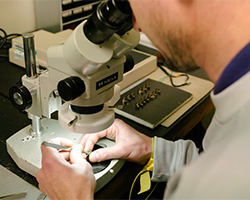6 May 2016
University announces collaboration on intelligent and versatile wireless technology

University engineers will develop unique wireless technology capable of measuring impacts to the body of both athletes and vulnerable patients.
The vibration sensor, which is discreet enough to be embedded in clothing, is also suitable for use in aerospace and automotive settings.
It is envisaged that the accelerometer – as it is also known – will make an impact in wearable technology because it contains microprocessors that are capable of handling large amounts of data. The device can be used to measure acceleration forces i.e. on a ship or aircraft, and can also sense the vibration of a machine, for example.
The fact that the technology will be wireless means that natural body movements will not be restricted, enabling athletes, for example, and sports equipment such as tennis rackets, to be accurately assessed for instances of impact and shock transmission.
The technology can also be put to good use in a hospital setting, providing reliable and immediate detection of falls by measuring the shock acceleration of a patient fall from a bed, for example. This sudden movement can also trigger an alarm so that immediate assistance and/or medical support can be delivered.
The University’s Wolfson School of Mechanical, Electrical and Manufacturing Engineering, which has expertise in wireless communications, has entered into a two-year collaboration with DJB Instruments (UK) Ltd.
The project, which represents an investment in innovation of almost £150,000, is anticipated to create new jobs and boost DJB Instruments (UK) Ltd’s profits by around £500,000 per year within three years.
Meanwhile, Loughborough University has secured grant funding of almost £100,000 towards the project through Innovate UK’s Knowledge Transfer Partnerships (KTP).














